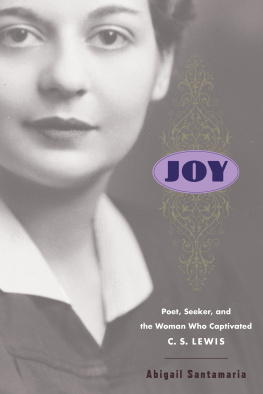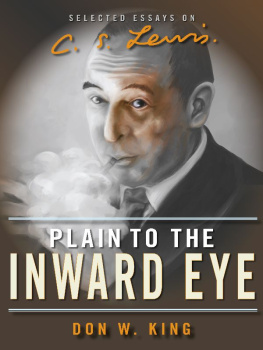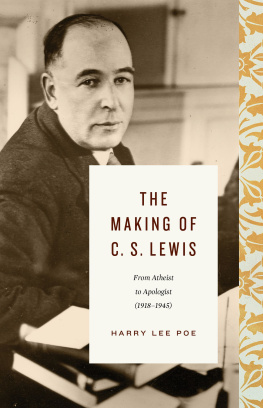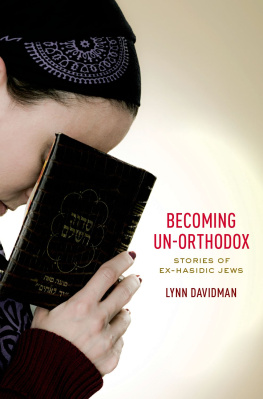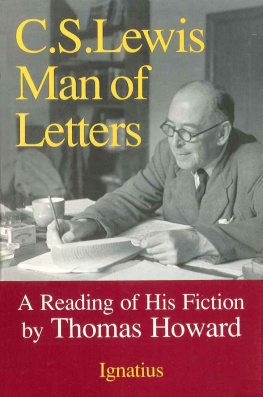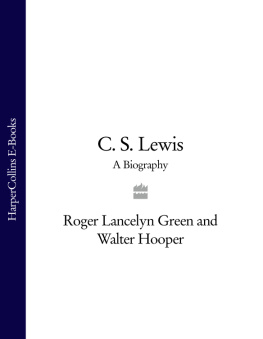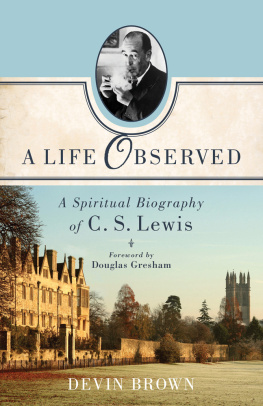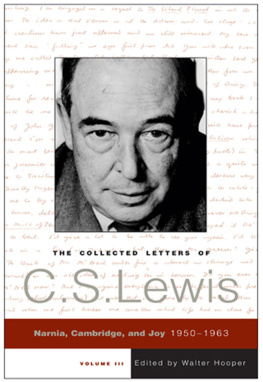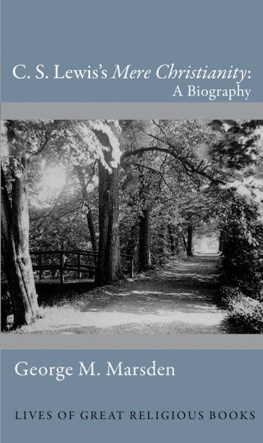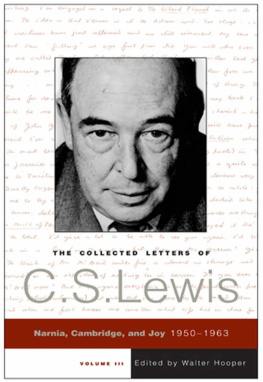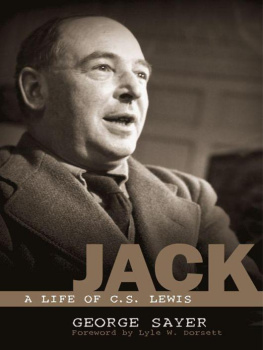Copyright 2015 by Abigail Santamaria
All rights reserved
For information about permission to reproduce selections from this book, write to Permissions, Houghton Mifflin Harcourt Publishing Company, 215 Park Avenue South, New York, New York 10003.
www.hmhco.com
The Library of Congress has cataloged the print edition as follows:
Santamaria, Abigail.
Joy : poet, seeker, and the woman who captivated C. S. Lewis / Abigail Santamaria.
pages cm
Includes bibliographical references and index.
ISBN 978-0-15-101371-5 (hardback) ISBN 978-0-547-84370-4 (ebook)
1. Davidman, Joy. 2. Women poets, AmericanBiography.
3. Authors spousesGreat BritainBiography.
4. Christian converts from JudaismUnited StatesBiography. I. Title.
PS3507.A6659Z86 2015
811'.54dc23
[B]
2014034506
The author is grateful for permission to quote from the following: Published and unpublished writings of Joy Davidman, courtesy of David Gresham and Douglas Gresham. Published and unpublished writings of William Lindsay Gresham, courtesy of David Gresham, Douglas Gresham, and Rosemary Simmons. Excerpts from the diaries of Warren Lewis, copyright The Marion E. Wade Center, Wheaton College, Wheaton, Illinois. Quotations from the works of C. S. Lewis: A Grief Observed, C. S. Lewis Pte. Ltd., 1961; Poems, copyright C. S. Lewis Pte. Ltd., 1964; Collected Letters, copyright 2000. Extracts reprinted by permission. Extracts from Jack: A Life of C. S. Lewis by George Sayer are reprinted by permission of Crossway Books.
Jacket design Martha Kennedy
Jacket photographs Susan Davidman Cleveland
v1.0815
For my parents,
Jaime and Sharon Santamaria
Introduction
Joy Davidman is best known today for her brief and tragic marriage to C. S. Lewis, a story immortalized in the Academy Awardwinning film Shadowlands and the Broadway play of the same title. As ably portrayed by Debra Winger in her Oscar-nominated performance, Joy was a feisty Jewish divorced single mother from the Bronx. Lewis, seventeen years her senior, was a lifelong confirmed bachelor, contentedly uninterested in romance until Joy toppled his emotional ramparts and thrust her way into the heart of the Oxford don who was the author of The Chronicles of Narnia and arguably the greatest Christian thinker of the twentieth century. They exchanged vows at her hospital bedside after a devastating diagnosis of metastasized breast cancer. Joy spent her final days dying in the arms of her most unlikely husband.
Shadowlands was all I knew about Joy until, as a New Yorker rocked by the events of September 11, 2001, I found myself struggling to reconcile God and suffering. Having benefited from Lewiss spiritual wisdom in the past, I again turned to him for insight. I picked up A Grief Observed, his raw, deeply personal confession of anguish and crisis of faith in the weeks following his wifes death. Lewiss profound esteem for Joy intrigued me and moved me enormously. Her mind was lithe and quick and muscular as a leopard, he writes in one particularly enchanting passage. Passion, tenderness, and pain were all equally unable to disarm it. It scented the first whiff of cant or slush; then sprang, and knocked you over before you knew what was happening. How many bubbles of mine she pricked! I soon learned not to talk rot to her unless I did it for the sheer pleasure... of being exposed and laughed at. I was never less silly than as [Joys] lover. She had filled every nook, said Lewis, of his heart, body, and mind.
What stunned me most, however, was his brokenness. I had recently read Lewiss Mere Christianity and The Problem of Pain, two nonfiction books in which he builds masterful cases for Christian tenets and dissects the purposes of pain without letting emotion muddle principle. Rife with logic and certainty, these texts speak to the parts of us that desire reason to override feelings. In contrast, the author of A Grief Observed is shattered, gripped by the power and primacy of emotion. I drew solace from the fact that this man whose faith I profoundly admired had responded to tragedy with the same reasonable questions: Where was God? And how could He? Like Lewis, I was skirting a danger more disturbing to me than ceasing to believe in God. The conclusion I dread is not So theres no God after all, he explains, but So this is what Gods really like. Deceive yourself no longer. Without compromising his Christianity, Lewis laments like a modern psalmist, keening in prose, shaking his fist in outrage at God.
Who was this woman whose loss so ravaged the man whom I, and millions of others, admire for his rock-solid faith? What were the forces that shaped her intellect and personality, driving these two disparate characters together? A basic search made me hungrier to know more. I learned that Joy was born during the Great War and came of age during the Great Depression. She joined the Communist Party of the United States of America (CPUSA) during the turbulent 1930s and wrote her way into the red-hot spotlight of New York Citys literary left. As the nation tumbled toward a second world war, she made a name for herself fighting fascism on the battlefield of the page, participating in rallies and symposiums alongside some of the most eminent voices of the century. I wanted to know more about her career, as well as about her troubled first marriage to the charismatic war veteran William Lindsay Gresham; about how she captivated the heart of C. S. Lewis; and about her influence on several of his finest booksSurprised by Joy,Till We Have Faces,The Four Loves. Contrary to what many people assume, Lewiss autobiography Surprised by Joy is not about the woman who edited its final draft and would become his wife two years after its publication. But it still has everything to do with what brought them together. Both Joy and Lewis longed, all their lives, for a spiritual realm that transcended both the beauty and the quotidian sting of earthly existence. I was intrigued by the spiritual journey that led this daughter of eastern European Jewish immigrants on a journey through Marxism and agnosticism, culminating in Christianity.
Everything I read about Joy left me wishing for a more thorough look at her pre-Lewis years, and a more balanced treatment of her story. Most accounts of her life seemed glazed with a kind of hero worship, perhaps meant to counterbalance disparaging characterizations by many of Lewiss Oxford friends. But Lewis, a Christian for whom humility was a way of life, would have eschewed the rose-colored-glasses approach. [Joy] was a splendid thing, he writes in A Grief Observed, a soul straight, bright, and tempered like a sword. But not a perfected saint. A sinful woman married to a sinful man; two of Gods patients, not yet cured. I was intensely curious about the authentic human struggles behind the popular romanticization.
When I contacted Joys son, Douglas Gresham, he put me in touch with a cousin, Susan Davidman Cleveland, Joys niece and the daughter of Joys only brother, Howard. Susan graciously invited me to Massachusetts to view and photocopy boxes of family papers, including a trove of Joys childhood photos, and letters written to and from her, her parents, and her brother. No one outside the family had ever seen this material. It was a biographers bliss. Susan connected me with her mother, Howards first wife, Ruth. She had known Joy well, often spending weekends during the war with Joy and Bill Gresham while Howard was stationed overseas. When we first spoke, Ruth expressed hesitation about being interviewed. On the one hand, no one had ever interviewed her, and she was eager to set the record straight about a certain defining period of Joys life. On the other hand, she was concerned that I wouldnt believe her.
Next page
